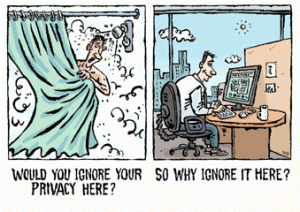
Funny, yet true, cartoon (From http://www.huxiu.com)
Privacy: It’s something many of us worry about giving up too much of, especially in the social media age where we share the play-by-play of our vacation as it’s happening, give our location coordinates in our Twitter bio and share photos of our children even before they’re born.
I’ve recently checked my privacy settings on Facebook and Twitter, but I couldn’t tell you when it was (at least in the last six months). If they are set the way you want them, I wouldn’t really think you would need to check them more than quarterly (unless the social network you use had a privacy breach or something of that nature).
How do you check your privacy settings? I’m not here to tell you that. That’s why we have Google searches.
However, I will offer some suggestions that social networks can use to make it easier for their users to maintain their privacy, kind of similar to some suggestions I gave for easier-to-understand terms and conditions.
-Make it simpler. These settings shouldn’t be hidden from people. They should be easy to find. Like it or not, you are making a site that your grandmother will use (i.e.: Facebook) and she should be able to find how to tweak her privacy settings with no problem. In addition to making them easy to find, they should also be easy to read and understand (not a page with thousands of words on it).
-Remind people to check them. If you don’t remind or prompt a person to do something, chances are, they won’t do it (especially if it’s something as non-sexy as checking privacy settings).
-Give people the most private settings to start. People can always make their profiles more open if they want, but give them the most secure settings as a default.
Speaking of privacy, what if you want to reach out to someone you don’t know? What if that person doesn’t want to be found by people they don’t know. These are some issues that journalists can come across in the information-gathering process.
Justin went over this in lecture this week, revisiting a discussion we had several weeks ago about contacting a friend of a crime suspect via social media. I would say that it is OK to contact this person via social media, as long as you identify who you are upfront. If possible, it may be even better to call this person or physically go to their home. Contacting a person on Facebook is akin to knocking on their door, a tough job, but one a journalist still must do.
Now, if that person does grant you access behind the curtain and accepts your Facebook friend request after you’ve identified yourself as a journalist, the question is it ethical to republish material from a private social media space?
I think while you do technically have access to the material, asking permission will probably give an added level of protection as well as continue to build trust with that source. After all, trust is an important aspect when it comes to letting down that privacy wall.
Jul 10, 2014 @ 05:34:35
Excellent post. I like your suggestions to social networks.